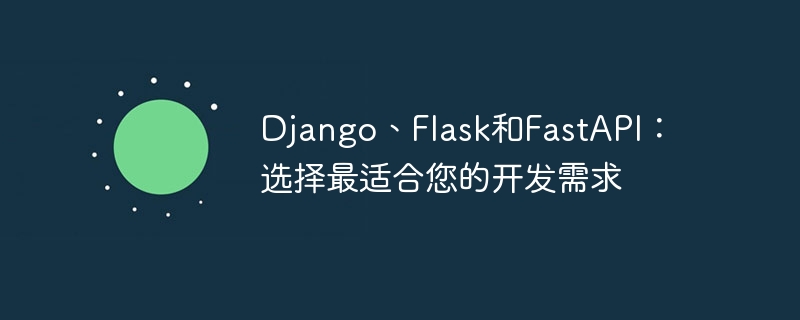Home >Backend Development >Python Tutorial >Django, Flask, and FastAPI: Choose the one that best suits your development needs
Django, Flask, and FastAPI: Choose the one that best suits your development needs
- PHPzOriginal
- 2023-09-29 10:49:432242browse

Django, Flask, and FastAPI: Choose the best fit for your development needs, specific code examples required
Introduction:
In modern web development, choosing the right one The framework is crucial. As Python continues to develop in the field of web development, frameworks such as Django, Flask and FastAPI are becoming more and more popular among developers. This article will introduce the characteristics and applicable scenarios of these three frameworks, combined with specific code examples, to help you choose the framework that best suits your development needs.
1. Django:
Django is a full-featured web development framework that focuses on quickly building high-quality, scalable web applications. It provides a powerful ORM (Object Relational Mapping) and template engine, allowing developers to manage databases and create user interfaces more easily.
Applicable scenarios:
- Complex web application development: If you need to build large, complex web applications, Django is a good choice. It provides many built-in functions and tools, such as user authentication, management backend, caching system, etc., to make the development process simpler and more efficient.
- Data-intensive applications: Django’s ORM is powerful and easy to use, helping you interact with your database easily. If you need to handle a lot of database operations, Django provides you with good support.
Sample code:
The following is a sample code for using Django to create a simple blog application:
# models.py
from django.db import models
class Blog(models.Model):
title = models.CharField(max_length=100)
content = models.TextField()
pub_date = models.DateTimeField(auto_now_add=True)
# views.py
from django.shortcuts import render
from .models import Blog
def blog_list(request):
blogs = Blog.objects.all()
return render(request, 'blog_list.html', {'blogs': blogs})
# urls.py
from django.urls import path
from .views import blog_list
urlpatterns = [
path('blog/', blog_list, name='blog-list'),
]
# blog_list.html
{% for blog in blogs %}
<h2>{{ blog.title }}</h2>
<p>{{ blog.content }}</p>
{% endfor %} 2. Flask:
Flask is a lightweight A web framework that focuses on simplicity and flexibility. It provides basic functions and tools, allowing developers to customize it according to their own needs. Flask does not have a built-in ORM and template engine, but it can be easily integrated with other third-party libraries.
Applicable scenarios:
- Small application development: If you need to quickly build a small web application or API, Flask is a good choice. Its lightweight and flexibility make the development process simple and easy to maintain.
- Apps for Specific Needs: Thanks to Flask’s flexibility, you can choose the features and tools you need based on your needs. If you need to integrate with a specific third-party library, Flask is a good choice.
Sample code:
The following is a sample code for using Flask to create a simple blog application:
from flask import Flask, render_template
app = Flask(__name__)
@app.route('/blog')
def blog_list():
blogs = [
{'title': 'Blog 1', 'content': 'This is blog 1'},
{'title': 'Blog 2', 'content': 'This is blog 2'},
{'title': 'Blog 3', 'content': 'This is blog 3'},
]
return render_template('blog_list.html', blogs=blogs)
if __name__ == '__main__':
app.run() 3. FastAPI:
FastAPI is a modern Web Framework focused on quickly building high-performance web applications. It is based on Python 3.7's type hints and asynchronous IO, and supports automatic generation of API documents and powerful request parameter verification.
Applicable scenarios:
- High-performance API development: If you need to build high-performance API applications, FastAPI is a good choice. Because FastAPI is based on asynchronous IO technology, it can achieve very efficient request processing and response speed.
- Large-scale real-time applications: FastAPI has excellent performance and is particularly advantageous when handling a large number of concurrent requests and real-time data.
Sample code:
Here is a sample code for creating a simple blogging API using FastAPI:
from fastapi import FastAPI
from pydantic import BaseModel
app = FastAPI()
class Blog(BaseModel):
title: str
content: str
blogs = []
@app.post('/blog')
def create_blog(blog: Blog):
blogs.append(blog)
return {'message': 'Blog created successfully'}
@app.get('/blog')
def get_blogs():
return blogs
if __name__ == '__main__':
import uvicorn
uvicorn.run(app, host='localhost', port=8000) Conclusion:
Before choosing a framework that suits your development needs When doing this, factors such as project scale, data operation requirements, and performance requirements need to be taken into consideration. Django is suitable for developing large and complex web applications; Flask is suitable for quickly building small applications; FastAPI is suitable for high-performance API development. Depending on your specific needs, choosing the most suitable framework will help improve development efficiency and project quality.
We hope that the introduction and sample code of this article can help you choose the framework that best suits your development needs and achieve good results in actual development.
The above is the detailed content of Django, Flask, and FastAPI: Choose the one that best suits your development needs. For more information, please follow other related articles on the PHP Chinese website!
Related articles
See more- Detailed explanation of Python using flask sqlalchemy to implement paging
- How to use scheduled tasks in FastAPI to perform background work
- How to create a simple GET request using FastAPI
- Flask and the FastAPI Framework: How to Quickly Prototype Web Applications
- Choice for large-scale projects: Django vs FastAPI

